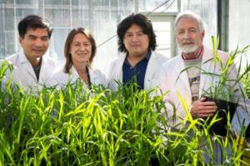Melbourne, Victoria, Australia
October 31, 2011
The global population hit the 7 billion mark Monday 31 October. However, 850 to 925 million people are already experiencing food shortages and with only 46 per cent of the 2.3 billion metric tons of cereal grain produced daily being consumed by humans, the world’s new population faces food insecurity.
 La Trobe University Professor of Botany, Roger Parish, and his team have been working on new technology for hybrid seed production which will not only have considerable economic advantages for Australian agriculture but may also be a line of defence as food supplies decline.
La Trobe University Professor of Botany, Roger Parish, and his team have been working on new technology for hybrid seed production which will not only have considerable economic advantages for Australian agriculture but may also be a line of defence as food supplies decline.
‘We have discovered a ‘Godfather’ gene that acts as a master switch in the pollen production process. We can manipulate the activity of the gene. It can be turned off to prevent pollen production and allow crossing with the pollen of a different line—outbreeding. The gene is subsequently reactivated in the hybrid plant, thereby ensuring pollen production occurs and hybrid grain is produced.’
‘This gene is present in wheat, barley, canola, cotton and rice meaning the technology is applicable to all these important crops,’ says Professor Parish.
‘Hybrid vigour is a way to increase yield in plants and in this world where we are running out of food very quickly, any way to increase production is important and hybrid vigour can increase production by up to 30 per cent,’ says Professor Parish.